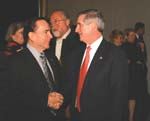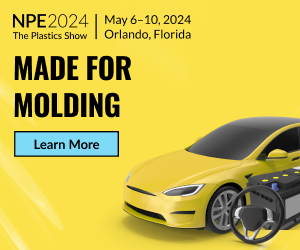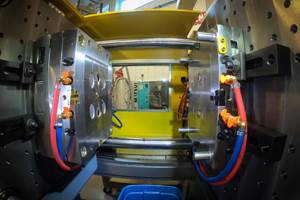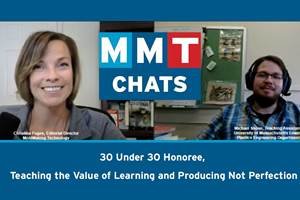The National Association of Manufacturers: Advocating Leadership and Involvement For Moldmakers
The NAM keeps moldmakers on top of government and legislative issues that are imperative to know to successfully run a shop in today's global marketplace.
The Washington, DC-based National Association of Manufacturers (NAM) has been around since 1895 and is the nation's largest industrial trade association. Representing small and large manufacturers in every industrial sector and in all 50 states, the NAM's primary mission is to "enhance the competitiveness of manufacturers by shaping a legislative and regulatory environment conducive to U.S. economic growth and to increase understanding among policymakers, the media and the general public about the vital role of manufacturing in America's economic future and living standards."
According to Darren McKinney, senior director, communications and media relations for the NAM, there are a number of moldmakers belonging to the organization, and he'd like to see that membership increase. "Whether you are making molds, mousetraps or widgets, the vast majority of issues that we deal with are universal to all businesses," McKinney notes. "Moldmakers need to turn on their lights, computers and run equipment—and that requires electricity and energy policy. Moldmakers also need to be aware of trade barriers, leveling the international playing field for trade and boosting U.S. exports. We are the leading voice in this. We also educate on topics like protecting intellectual property."
McKinney notes that NAM's members set the association's policies. "Our structure is built around an elected chairman serving a one-year term, executive committee, board of directors, policy committees, working groups and professional staff," he explains. "Policy committees address issues and recommend policy to the executive committee and the board. The active participation of small and medium manufacturers (SMMs) helps ensure that adopted policies respond sufficiently to the needs of all NAM members."
American Manufacturing Challenges
Manufacturing in America is essential to this country's survival, McKinney asserts, because it is the largest contributor to economic growth and spawns more economic activity and related jobs than any other sector. He offers the following statistics to support his views: manufacturing funds accounts for roughly two-thirds of private sector R&D and U.S. exports—comprising more than $50 billion per month. However, manufacturing had lost 2.8 million jobs from July 2000 through January 2004. "In part, this reflected an expected downturn following a long expansion characterized by exuberant investment," McKinney points out. "But manufacturing's eventual recovery had been very slow to start by historical standards. However, the manufacturing sector—by way of its GDP (gross domestic product) contribution—outgrew the overall the overall economy by roughly 50 percent in 2004. In other words, it led all sectors in growth last year—for the first time in five years—and is expected to do that again in 2005."
This is why the NAM has been very active. "We focus largely on broader macro issues like leveling the playing field for international trade, reducing the cost of doing business here in the U.S. by reining in rapacious trial lawyers with tort reform, better educating a 21st century workforce, and improving our engineering, science and math curricula in high schools and higher education," he explains.
"For the last 20 or 30 years, we have relied—to a large extent—on foreign students who train at the PhD level in science and engineering," McKinney continues. "We have benefited from this—and I imagine moldmakers have as well. But, as developing countries improve their own economic outlooks, these students are taking their expertise back home instead of remaining here. In the next several decades these smart kids won't even bother to come to the U.S., having found ample educational opportunities in their own countries. If we don't attract American kids to higher learning for these subjects, we will face a skills shortage."
Another challenge the U.S. faces is external, non-production costs that make it difficult to manufacture in the U.S. "U.S. manufacturers spend, on average, 22 percent more on non-labor costs than their leading foreign rivals," McKinney notes. "These extra costs include corporate taxes, employee benefits, tort litigation, regulatory compliance and unnecessarily high energy costs stemming from the absence of a national energy policy."
Keeping Manufacturing Alive
In order to address these challenges, the NAM Board has established a number of campaigns and foundations:
- Campaign for Growth and Manufacturing Renewal—designed to focus the nation's attention on manufacturing's contributions to overall economic growth and prosperity—also discusses the implications for this country if the manufacturing base is allowed to decline.
- The Manufacturing Institute—the intellectual research foundation for the Campaign for Growth and Manufacturing Renewal—was founded in 1991 as an educational and research affiliate of the NAM to inform policymakers and the media that American prosperity depends on strong economic growth, fueled by a competitive manufacturing base.
- Coalition for the Future of Manufactur-ing—comprised of several hundred manufacturing associations and individual companies—is dedicated to raising awareness of the importance of a strong manufacturing base to American prosperity and the challenges facing U.S. manufacturers today, and to lobbying for pro-growth public policy changes that will encourage a vibrant U.S. manufacturing base in the future.
Setting Policies
Since 2003, the NAM has won several significant victories on behalf of its members—including small manufacturers. According to McKinney, a tax-cut package provides accelerated income-tax cuts for individuals (and S corporations); reduced rates on dividends and capital gains; bonus depreciation; and increased business expensing. The Medicare reform law provides prescription drug benefits, relieves some of the burden on NAM members that provide retiree health benefits and creates a new type of employee health care account. Trade accords with Chile and Singapore expand opportunities for NAM members.
"As the dollar's value against foreign currencies moves back toward historic levels, U.S. exports are at record highs," McKinney states. "We can further expand those exports with free trade agreements that level the international playing field for American goods and services."
McKinney concludes optimistically that, "America's manufacturing future in innovative, cutting-edge technologies can be very bright. We'll need a highly skilled workforce and more research and development to capitalize on 21st century economic opportunities. If government helps with such investments and actively works to reduce the cost of doing business, all working Americans will benefit."
Related Content
Predictive Manufacturing Moves Mold Builder into Advanced Medical Component Manufacturing
From a hot rod hobby, medical molds and shop performance to technology extremes, key relationships and a growth strategy, it’s obvious details matter at Eden Tool.
Read MoreHow to Improve Your Current Efficiency Rate
An alternative approach to taking on more EDM-intensive work when technology and personnel investment is not an option.
Read MoreICYMI, MMT Chats: 30 Under 30 Honoree, Plastics Engineering TA Teaches Value of Learning and Producing Not Perfection
MoldMaking Technology Editorial Director Christina Fuges brings on UMass Lowell Plastics Engineering Teaching Assistant Michael Shone as a guest for this MMT Chat to discuss moldmaking through the lens of academia. This episode is brought to you by ISCAR with New Ideas for Machining Intelligently.
Read MoreExploring ISO 9000 - Part 16 Control of Quality Records
A Series of International Standards for Quality Management and Quality Assurance. We begin 2022 with a review of Clause 4.16 Control of Quality Records.
Read MoreRead Next
Are You a Moldmaker Considering 3D Printing? Consider the 3D Printing Workshop at NPE2024
Presentations will cover 3D printing for mold tooling, material innovation, product development, bridge production and full-scale, high-volume additive manufacturing.
Read MoreHow to Use Strategic Planning Tools, Data to Manage the Human Side of Business
Q&A with Marion Wells, MMT EAB member and founder of Human Asset Management.
Read More















.jpg;maxWidth=300;quality=90)








